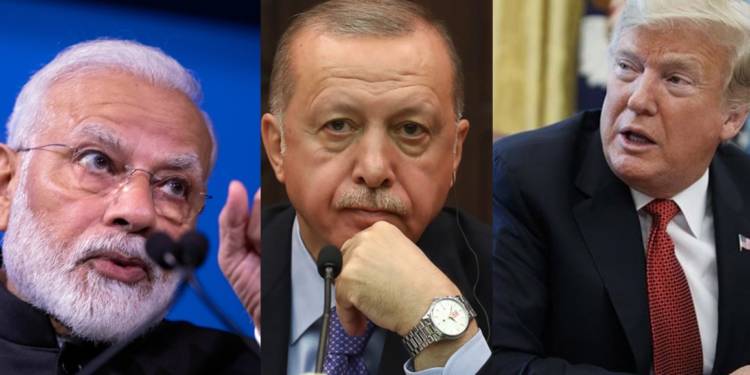In what comes as a major setback for Turkey, the US Congress has passed a resolution condemning the massacre of 1.5 million Armenians carried out by Turkey’s predecessor, the Ottoman Empire during the First World War. The resolution explicitly recognises the massacre of 1.5 million Armenians by the Ottoman Empire more than a century ago as a ‘genocide’.
The resolution, passed with an overwhelming majority with lawmakers voting 405-11, has laid down that the US policy will, “(1) commemorate the Armenian Genocide through official recognition and remembrance; (2) reject efforts to enlist, engage, or otherwise associate the United States Government with denial of the Armenian Genocide or any other genocide; and (3) encourage education and public understanding of the facts of the Armenian Genocide, including the United States role in the humanitarian relief effort, and the relevance of the Armenian Genocide to modern-day crimes against humanity.”
This resolution has been passed by the US Congress amidst the ongoing Turkish incursion into North-east Syria, codenamed as Operation Peace Spring, during which the Turkish forces along with its pro-Turkey Jihadi militias has reportedly committed some of the most heinous war crimes ranging from civilian executions to the use of white phosphorous and other chemical weapons.
Rep. Gus Bilirakis (R-Fla.), a co-chair of the Armenian Caucus spoke about the resolution condemning the Ottoman Empire for carrying out the genocide of 1.5 million Armenians and said, “Today we end a century of international silence that will not be another period of indifference or international ignorance to the lives lost to systematic murder.” Bilirakis also spoke about Turkey’s ongoing incursion in North-east Syria and said that Turkey’s “current actions against our Kurdish allies is extremely concerning and we cannot stand by and let egregious human rights violations happen.”
The Armenian Genocide took place between 1914 to 1923 during which the Ottoman Empire carried out the ethnic cleansing of 1.5 million Armenians. The genocide is believed to have begun on April 24, 1915, when the Ottoman authorities executed hundreds of Armenian intellectuals.
After that, the ordinary Armenians were pushed out of their homes and sent on death marches in the Mesopotamian desert without food and water until they dropped dead. Those who stopped during these death marches were shot dead. The killing squads, comprising of murderers and other convicted criminals, also employed merciless means to murder Armenians living in the Turkish countryside- drowning them in rivers, pushing them off cliffs, crucifying them and even burning them alive.
The population of the Armenians in the Ottoman Empire was about 2 million before the massacre. By the end of this genocide, less than 4 lakh Armenians were left in the Ottoman Empire.
While the Turkish President spoke about make-believe atrocities in Kashmir in a way detrimental to India’s interests, Turkey has consistently played down the mass killings of Armenians and has also time and again rejected the fact of their genocide. Turkey has shamelessly disputed the number of Armenians who were killed despite the fact that the figure of 1.5 million casualties is a generally accepted fact. Turkey has also denied that there was any pre-conceived plan to wipe out the Armenians. Turkey argues that the victims were the casualties of the First World War, or were murdered by the Russians.
Even after the US Congress passed a resolution recognising the genocide carried out more than a century ago, Turkey has remained steadfast in its insensitive approach of denying that the Armenian genocide took place. Turkish Foreign Minister Mevlut Cavusoglu has criticised the US Congress resolution recognising and rebuking the Ottoman Empire for the genocide of Armenians and has also called it a “shameful decision of those exploiting history in politics (it is) null and void for our government and people.”
Leave alone the idea of apologising for the brutal genocide of the Armenians, Turkey does not even acknowledge the fact that it committed the mass murder of the Armenians during the First World War.
India, on its part, seems to have taken a step in the right direction after PM Modi met the Armenian PM Nikol Pashinyan on the sidelines of the 74th UN General Assembly, that was also seen as a subtle hint of India’s diplomatic counter-offensive to Turkish President Erdogan’s objectionable remarks about Kashmir.
However, the fact that the US Congress has now recognised the mass killing of Armenians by the Ottoman Empire as a genocide, warrants a clear and unequivocal stance by India over this issue. India must also formally recognise the mass murder of Armenians by the Ottoman Empire in the early twentieth century as a genocide.
The Turkish President’s utterances undermining India’s territorial interests warrant a sustained, strong diplomatic reaction by India and recognising the massacre of 1.5 million Armenians by the Ottoman Empire can be one of the dimensions of this diplomatic counter-offensive.




























